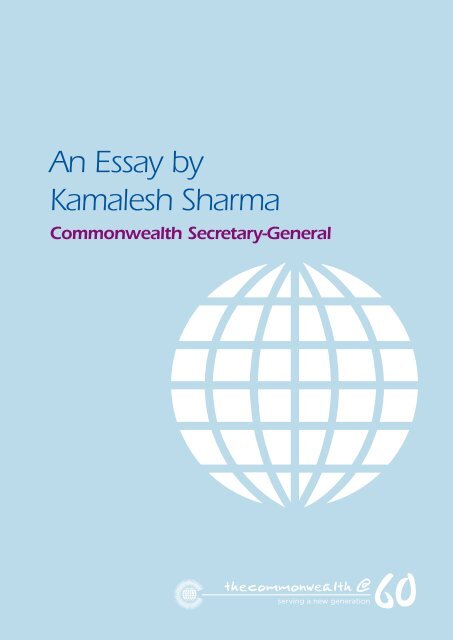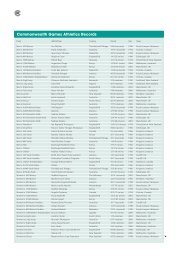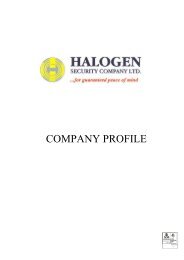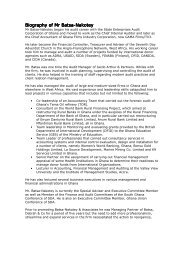An Essay by Kamalesh Sharma - Commonwealth of Nations
An Essay by Kamalesh Sharma - Commonwealth of Nations
An Essay by Kamalesh Sharma - Commonwealth of Nations
Create successful ePaper yourself
Turn your PDF publications into a flip-book with our unique Google optimized e-Paper software.
The <strong>Commonwealth</strong> at 60:the uncut diamonds<strong>Commonwealth</strong> Secretary-General <strong>Kamalesh</strong> <strong>Sharma</strong>The world stood on the cusp <strong>of</strong> a historic transformation in 1949, when the modern <strong>Commonwealth</strong> wasfounded. It does so, too, 60 years later in 2009. The abiding strengths <strong>of</strong> the <strong>Commonwealth</strong> – in its values,concerns, vitality and foresight – can make it ever more meaningful in its 60th anniversary year and beyond.<strong>Kamalesh</strong> <strong>Sharma</strong>,the <strong>Commonwealth</strong>Secretary-GeneralThe 60th anniversary <strong>of</strong> the creation <strong>of</strong> the modern<strong>Commonwealth</strong> in 2009 is cause for celebration: we are proud tobe part <strong>of</strong> this great global good. More important, it should spurserious reflection on the <strong>Commonwealth</strong>’s future direction, in theage <strong>of</strong> anxieties, promise and flux now upon us. In a fast-changingand ever more challenging world, we must continually ask how weserve our purpose for our 53 member countries, and also for theglobal community beyond. We approach the landmark with a keenawareness both <strong>of</strong> the enormous achievements <strong>of</strong> the<strong>Commonwealth</strong> over 60 years, and the need to build on them.The <strong>Commonwealth</strong> has indeed served the needs <strong>of</strong> itsmembership, and will continue to do so. Standing still is not anoption, and never has been: a vital ingredient in the<strong>Commonwealth</strong>’s success has been the way it has grown andevolved, responding to the challenges <strong>of</strong> its times.Change and constancy:the 60-year-old <strong>Commonwealth</strong>The world <strong>of</strong> today is shedding the political and economic markersthat were the fixtures <strong>of</strong> the old global order. The polarity <strong>of</strong> Eastand West in global politics has all but vanished, and the onebetween North and South in global economics is steadilyevaporating. Centres <strong>of</strong> political and economic influence havemultiplied, and the global community looks to new guardians andpromoters <strong>of</strong> the collective good in a rapidly globalising andcompacting world.The <strong>Commonwealth</strong> is part <strong>of</strong> this search, and part <strong>of</strong> the solution. Itis a partner in bolstering the intrinsic strengths <strong>of</strong> its member states,through building capacity and strengthening institutions, and throughpursuing the values <strong>of</strong> democracy and public ethics. It also championsthe search for global arrangements which embrace the interests <strong>of</strong>the small and vulnerable in the global community. It believes thatethical and sustainable globalisation can only be inclusiveglobalisation. It advocates development, and also the ends <strong>of</strong> justice.In 60 years, its challenges have been transformed, its populationand its membership have grown, but the values guiding it haveremained constant. The <strong>Commonwealth</strong> principles <strong>of</strong> democracy,freedom, peace, the rule <strong>of</strong> law and opportunity for all, were setdown and progressively deepened in Singapore in 1971, Harare in1991 and Millbrook in 1995. They were strengthened <strong>by</strong> the 2003Latimer House Principles defining and differentiating the roles <strong>of</strong>the three pillars <strong>of</strong> government: the executive, the legislature andthe judiciary. The <strong>Commonwealth</strong> Ministerial Action Group (CMAG)has been the primary safeguard against serious and persistentviolation <strong>of</strong> those values, as well as being a prime mover in therestoration <strong>of</strong> those values, and <strong>of</strong> democratic constitutionalism.These <strong>Commonwealth</strong> values have found expression in the work <strong>of</strong><strong>Commonwealth</strong> special envoys in countries across the Caribbean,Africa, Asia and the Pacific – brokering dialogue, and buildingsupport for the institutions <strong>of</strong> democratic governance.Equally, the <strong>Commonwealth</strong> has always advocated developmentand worked towards it. The association knows full well that itsmembers seek growth and prosperity. In the World TradeOrganization and other international and regional tradenegotiations, its tireless campaigning for both freer and fairerglobal trade is testimony to this. The lob<strong>by</strong>ing has had practicalback-up in <strong>Commonwealth</strong> efforts to allow countries to benefitfrom the potential <strong>of</strong> easier trade access – for instance, throughnegotiating support in Geneva and Brussels for small states, andthrough helping to bring about better trained <strong>of</strong>ficials, easiercustoms services, higher standards and new national approaches toexport products and services. The same development stimulus hasbeen achieved in its work on cancelling debt burdens, developingsmall- and medium-sized business strategy and capacity, andunlocking some US$800 million in investment through the various<strong>Commonwealth</strong> funds which have been injected into theCaribbean, Africa, Asia and the Pacific.2 The <strong>Commonwealth</strong> Yearbook 2009
The <strong>Commonwealth</strong> at 60: the uncut diamondsThe ‘organisation <strong>of</strong> values’ has been seen most obviously in the<strong>Commonwealth</strong>’s perennial support for vulnerable and fragilestates, threatened <strong>by</strong> marginalisation. The clearest sign <strong>of</strong> itsconcern for equality <strong>of</strong> opportunity has been its tirelesscampaigning for the interests <strong>of</strong> its smaller member states – <strong>of</strong>tenexposed to much more powerful economic forces, yet equally <strong>of</strong>tenresilient and resourceful, in building societies around the quality <strong>of</strong>their people.The challenges facing this modern <strong>Commonwealth</strong> today are asgreat as ever. Nearly three-quarters <strong>of</strong> a billion <strong>of</strong> its people live indollar-a-day subsistence poverty; 75 million <strong>of</strong> its children are not inschool, whether primary or secondary. Nearly 30 million <strong>of</strong> itscitizens carry the HIV virus or AIDS. While its low-lying islands anddeltas face submersion, its deserts expand, its crop yields arepinched and its food prices rise. The <strong>Commonwealth</strong> is aschallenged as any international organisation in seeing its memberswalk tall on the long and difficult path to democratic stability,economic prosperity and social harmony.Looking back: the <strong>Commonwealth</strong>in 2008<strong>Commonwealth</strong> member states have had to cope with themounting global crises <strong>of</strong> climate change, food security, energy andfinancial turmoil. The task <strong>of</strong> the association is to establish where itcan add concretely to meeting worldwide challenges, not least <strong>by</strong>using its enormous convening power.There is no better example than its contribution in the context <strong>of</strong>the debate on the reform <strong>of</strong> the international financial institutions.Heads <strong>of</strong> Government themselves (Kampala, November 2007) hadtasked the <strong>Commonwealth</strong> Secretariat with looking at how thoseglobal institutions could better reflect the realities and challenges <strong>of</strong>the twenty-first century.We responded <strong>by</strong> bringing 11 <strong>Commonwealth</strong> leaders to Londonin June 2008, to address the reform <strong>of</strong> the Bretton Woodsinstitutions, the continuing quest for coherence across the United<strong>Nations</strong> system, and the coherence and effectiveness <strong>of</strong> globalenvironmental governance.The resulting Marlborough House Statement established theoverarching principle <strong>of</strong> inclusiveness, that international institutionsshould be designed to benefit all their members, and shouldtherefore give a voice and platform to all – especially the smallerand developing states.Beyond inclusiveness, the <strong>Commonwealth</strong> called for the matchingprinciples <strong>of</strong> legitimacy, responsiveness, flexibility, transparency andaccountability, and effectiveness. All 53 <strong>Commonwealth</strong>governments then formally endorsed the Statement, when ourHeads <strong>of</strong> Government met on the eve <strong>of</strong> the UN General Assemblyin New York in September 2008. We will continue to work throughthe UN and the G20 on our inclusive vision <strong>of</strong> reform <strong>of</strong> theBretton Woods institutions, while our <strong>Commonwealth</strong> environmentministers will discuss the issue <strong>of</strong> global governance in Nairobi,Kenya, in February 2009.Meanwhile a year that began with violence and unrest in the wake<strong>of</strong> Kenyan elections ended with collapse and disease in a former<strong>Commonwealth</strong> member, Zimbabwe. In Kenya, we played a partboth in observing elections and <strong>of</strong>fering practical support to therebuilding <strong>of</strong> democratic institutions, above all the electoral andhuman rights commissions. In Zimbabwe we have been vocal inexpressing support and solidarity with the people <strong>of</strong> that country,and with African efforts to bring about democratic and economicstability. The year saw Pakistan readmitted to the councils <strong>of</strong> the<strong>Commonwealth</strong> after successful elections in February, while FijiIslands remains suspended from those councils and on the agenda<strong>of</strong> CMAG. The <strong>Commonwealth</strong> has played important roles in otherelections, too, and most notably in Bangladesh, Ghana andMaldives. Having helped introduce a new national constitution inMaldives, the <strong>Commonwealth</strong> observed elections there that sawthe peaceful transfer <strong>of</strong> power after two closely and fairlycontested rounds <strong>of</strong> voting.Our 2008 ministerial agenda, too, saw us placed firmly at the toptable <strong>of</strong> topicality.• <strong>Commonwealth</strong> youth ministers in Colombo in April discussedthe vital youth element – in policy, practice and budget – thatshould feature in every government department and decision.• Our health ministers in Geneva in May discussed the potential <strong>of</strong>e-health, not just to improve the quality <strong>of</strong> health services, butalso the quantity – both <strong>of</strong> services and <strong>of</strong> people reached.• Law ministers in Edinburgh in July discussed a range <strong>of</strong> highlytopical subjects, from juvenile justice, to combating corruption,to prison overcrowding.• Sports ministers in Beijing in August discussed the central role <strong>of</strong>sport as a tool for the empowerment and education <strong>of</strong> youngpeople, individually and collectively.• Foreign ministers in New York in September discussed progresson the governmental mandates given to the <strong>Commonwealth</strong> inUganda last year in areas like climate change and promotingrespect and understanding between different communities.• Finance ministers in St Lucia in October discussed the food, fueland finance crises, and took forward the Heads <strong>of</strong> Governments’direction on reforming international institutions.• Tourism ministers in London in November discussed ways <strong>of</strong>supporting employment for the poor in the industry, when facedwith a global downturn.<strong>An</strong>d just as importantly, our <strong>Commonwealth</strong> people have been onthe ground – strengthening election and human rightscommissions, training young people and women entrepreneurs,advising on maritime boundaries, and myriad other tasks in whicha small amount <strong>of</strong> technical assistance can yield the benefits <strong>of</strong>new and shared best practice, <strong>of</strong>ten with investment to follow.Much <strong>of</strong> the best <strong>of</strong> <strong>Commonwealth</strong> work is practical, painstaking,unglamorous and out <strong>of</strong> sight. It confirms our status as a tried-andtrustedpartner.In any given year, we have more than 450 experts and residentin-house advisers executing 600 small-scale projects, worth some£25 million, in more than 45 developing member states andoverseas territories. Their pursuit is sustainable development andgood governance.The <strong>Commonwealth</strong> Yearbook 2009 3
<strong>Commonwealth</strong> Secretary-General <strong>Kamalesh</strong> <strong>Sharma</strong>Looking ahead: the <strong>Commonwealth</strong>in 2009 and beyondAs we enter a new year, in which our topicality and relevance willagain define us, I see several continued challenges for 2009 andbeyond.Young people: the future <strong>of</strong> the <strong>Commonwealth</strong>Young people are at the core <strong>of</strong> those challenges and are central tothe theme the <strong>Commonwealth</strong> has chosen for its anniversary year:thecommonwealth@60 – serving a new generation.We are a young <strong>Commonwealth</strong>, with half <strong>of</strong> our populationunder 25 and a quarter under 5. It is young people who will inheritthe century and live through most <strong>of</strong> it. They carry a fatefulresponsibility to see us through the dilemmas and dangers we havecreated for ourselves. We need timely, wise and sustainablesolutions. Our attitudes and policies have to equip and empoweryoung people to take on their responsibilities with confidence.A strong element <strong>of</strong> the <strong>Commonwealth</strong> vision <strong>of</strong> youthempowerment should be a sustained and coherent promotion <strong>of</strong>youth entrepreneurship in a way that can embrace the educationsystem, the trade and industry bodies, the national andinternational financing bodies, and above all governments. Many<strong>of</strong> our ideas have been pioneering: the <strong>Commonwealth</strong> YouthProgramme, set up in 1974, was the first <strong>of</strong> its kind amonginternational organisations. Through it, we have developedsuccessful models <strong>of</strong> youth training, mentoring and micr<strong>of</strong>inancing,through the CYP and its Youth Credit Initiative. Thechallenge for 2009 is to ensure that governments embrace our best<strong>Commonwealth</strong> practice and take it higher and wider. The newgeneration expects and deserves nothing less.The environment: the future <strong>of</strong> the planetIt is young people, more than any, who are more alive to theenvironmental threats to the planet, which will continue topreoccupy the <strong>Commonwealth</strong> in 2009. Global warming isbeginning to receive the collective attention it deserves. The<strong>Commonwealth</strong> is focusing on the six elements <strong>of</strong> the Lake VictoriaClimate Change Action Plan, which, from within the largeenvironmental agenda, was adopted at the Kampala CHOGM inNovember 2007. We chose those few, targeted areas where weknew we could make a difference.Efforts continued to encourage wider ownership <strong>of</strong> the pioneering<strong>Commonwealth</strong> initiative in the Iwokrama rainforest in Guyana,both as a model and as an individual project. Its innovative thinkinginvolves private sector funding, local ownership, governmentsupport and international partnership, and the underlyingconviction that a rainforest is worth more alive than dead.In 2008, the <strong>Commonwealth</strong> initiated a programme <strong>of</strong> support inenvironmental negotiations for small states, as it has done in thearea <strong>of</strong> trade for some years. Leading up to the CopenhagenConference in December, the year 2009 will be a significant one inglobal environmental negotiations. Linked to them are the<strong>Commonwealth</strong>’s attempts to advance recognition <strong>of</strong> the fracturedand there<strong>by</strong> diminished impact <strong>of</strong> current instruments for ‘global’environmental governance. Our environment ministers may wellwiden the <strong>Commonwealth</strong> remit when they meet in Nairobi inFebruary 2009.Women: the ‘litmus test’ <strong>of</strong> developmentWith the adoption <strong>of</strong> the Millennium Development Goals (MDGs),the world community gave itself – for the first time – a universalset <strong>of</strong> targets. Within these, those affecting women constitute the‘litmus test’ <strong>of</strong> core development. The <strong>Commonwealth</strong> recognisesthis, and works for it. It adopted a long-term Plan <strong>of</strong> Action forGender Equality in 2005. Its work in fields such as women’sentrepreneurship, gender-sensitive budgeting and the role <strong>of</strong>women in governance is already recognised. This solidarity <strong>of</strong> the<strong>Commonwealth</strong> in the advancement <strong>of</strong> women’s rights and causes,through advocacy and engagement, must continue and bestrengthened.Technology: a catalyst for developmentTechnology is now a prime enabler and solution provider to thechallenges <strong>of</strong> development, whether through ICT penetration,distance learning or e-services. The <strong>Commonwealth</strong> should lift itsimpact through its <strong>Commonwealth</strong> Connects programme, andother means, to assist in the building <strong>of</strong> digital bridges to overcomethe development divide. The scope <strong>of</strong> networking and interactivetools also opens up the field <strong>of</strong> connectivity between memberstates. There are huge potential benefits in sharing information,disseminating best practices and opening channels <strong>of</strong> collaboration.We therefore intend to explore the creation <strong>of</strong> a portal as aPartnership Platform – a web resource that can function as amarketplace for the sharing <strong>of</strong> best developmental and democraticpractice across the <strong>Commonwealth</strong>.Collective action and partnership: a global communityThe <strong>Commonwealth</strong> works in concert with the like-minded. Ourwork thus far with bodies affiliated to the UN, and otherinternational and regional bodies, illustrates the theme that if anorganisation is looking out on its members’ and the world’sinterest, it must partner with the rest <strong>of</strong> the world, and make itsown best thinking and practice available beyond its borders.On its own, the <strong>Commonwealth</strong> – not unlike other, much betterendowed organisations – does not have the capacity or theleverage to meet all its goals. Hence the need to build alliances andstrategic partnerships, towards shared purposes.<strong>Commonwealth</strong> ideas have been taken up <strong>by</strong> the World Bank onsmall states, <strong>by</strong> the World Health Organization on migratingdoctors and nurses, <strong>by</strong> the International Labour Organization onmigrating teachers, and <strong>by</strong> the UN system on indicators <strong>of</strong> youthdevelopment. Our support and expertise have been enlisted <strong>by</strong> theEuropean Union and the African Union on building governance inAfrica, and <strong>by</strong> the EU and the Pacific Islands Forum on buildinggovernance in the Pacific. Perhaps best known, the<strong>Commonwealth</strong> initiatives <strong>of</strong> bilateral and multilateral debt relief(first discussed at our Finance Ministers Meetings <strong>of</strong> 1987 and1997 respectively) have led to well over US$100 billion worth <strong>of</strong>debt burden removed and funds redeployed where they are mostneeded, especially in health and education.4 The <strong>Commonwealth</strong> Yearbook 2009
The <strong>Commonwealth</strong> at 60: the uncut diamondsYoung people at an election rallySeen from afar, this might be taken as ‘globalisation <strong>by</strong> accident’.Wisdom is a resource to be shared, and the <strong>Commonwealth</strong> cando more – in new working relationships, new funding partnershipsand in information-sharing as we build on our own 53-nation,public-, private and third-sector network, and make it available toothers.The <strong>Commonwealth</strong> past, present,future: moving with the timesThe modern <strong>Commonwealth</strong> has been an association that hasmade historic contributions appropriate for the times. More thanany other organisation, it introduced in the post-colonial era thepioneering idea <strong>of</strong> a diverse and emerging internationalcommunity, with a common stake in the world. It steppedseamlessly from the old world into the new. This was amomentous development, progressively achieved. A collaborativebody <strong>of</strong> nations emerged, representing enormous differences, yetat peace with itself and engaged towards the shared purpose <strong>of</strong>shaping a better world.It did not shy away from the hard political task posed <strong>by</strong> obdurate,racist states in Southern Africa resisting the tide <strong>of</strong> Africanindependence. The <strong>Commonwealth</strong> was the organisation that tookup the gauntlet and helped to navigate this historic and torridpassage.The <strong>Commonwealth</strong> was saved from the sterility <strong>of</strong> the Cold Warand moved quickly to grasp the opportunities <strong>of</strong> the post-Cold Warera. It established a body <strong>of</strong> far-reaching governance benchmarks,which have no parallel elsewhere. In turn, these have influencedstandard-setting in both regional and global organisations. Itmoved its progressive agenda across a broad front <strong>of</strong> stakeholders,including the third sector and the private sector.The <strong>Commonwealth</strong> is now tooling itself for the challenges andopportunities <strong>of</strong> the twenty-first century. As a versatile, responsive,creative organisation, unhampered <strong>by</strong> self-regulation – alwayscontemporary in spirit and style – it is eminently equipped to do soin the face <strong>of</strong> today’s threats and opportunities, and to continue toexercise the core wisdom function which is more sorely needed nowthan ever. The world has seen the escalating globalisation <strong>of</strong> factors<strong>of</strong> production, connectivity, communication, economic and culturallife, movement <strong>of</strong> people, the civil society and – unfortunately – theuncivil society as well. In the light <strong>of</strong> the critical challenges before us,it would be well served <strong>by</strong> the globalisation <strong>of</strong> wisdom. The<strong>Commonwealth</strong> has shown itself to be capable <strong>of</strong> addressing thisdeficit: it is and will remain a force for enlightened change.This is the ‘globalist’ <strong>Commonwealth</strong> within a ‘globalising’ world.Globalism is different from globalisation: it is an actively pursuedmindset, which sees the world as joined and interdependent, andforges collective responses to shared challenges. The <strong>Commonwealth</strong>is uniquely placed to do that. Simply put, it should enhance its statusas an enlightened and engaged actor on the world stage.This is the <strong>Commonwealth</strong> at 60 – lifted <strong>by</strong> and alive to what it hasachieved, but ever more mindful <strong>of</strong> the need to move onwards,outwards, upwards. The hexagenerian, on its diamond anniversary,has cause to examine its precious stones. Many <strong>of</strong> its diamonds areproudly worn – while as many are as yet uncut.January 2009The <strong>Commonwealth</strong> Yearbook 2009 5






